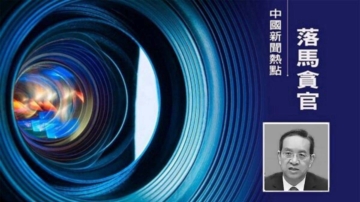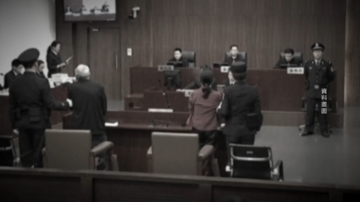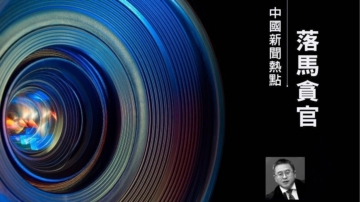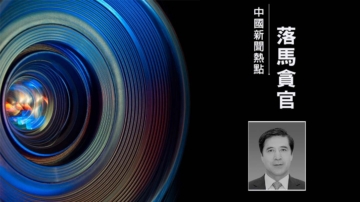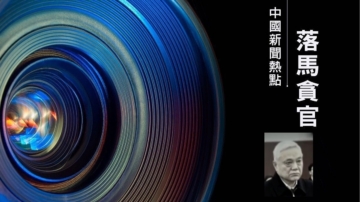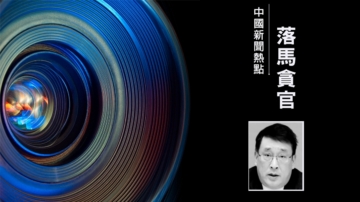【新唐人2013年10月04日訊】近年來,中共官場貪污腐敗成風,致使其政權面臨空前危機。中共十八大後,王岐山出任中紀委書記,高舉反腐大棒,從派出中央巡視組,到互聯網反腐,到九月初開通的中紀委、監察部舉報網站,好像打了一些老虎和蒼蠅。有媒體指出,王岐山之所以著力反腐,是因為他面臨的危機,是中共建政以來最大的危機。
據香港《南華早報》報導,在九月初正式開通的中紀委、監察部舉報網站,二十多天已收到舉報信一萬五千多件。報導還宣稱,王岐山是不可多得的危機處理高手,但他要處理的是中共建政以來最大危機。
時事評論員汪北稷認為,從王岐山從政及他個人的特點來看,是一個想做事的人,但是他跳不出共產黨這個框框。
汪北稷:「因為腐敗的根源是權力的腐敗,包括王岐山本人,或者權力的方式,也是腐敗的,他知道這個共產黨的狀況,他是以挽救共產黨的心態來反腐,那麼第一不傷及共產黨權力的腐敗,第二要玩出新花樣來挽救崩潰的民心,所以在這兩種不可調和的矛盾夾擊下,他拿出一些所謂的新花招。」
汪北稷表示,王岐山面臨的最大危機就是中共政權合法性的危機。
汪北稷:「所以它不斷的要來說文化大革命是一個錯誤,它改正了這個錯誤,之後呢,它說它發展了經濟,提高了人們的生活水準,現在共產黨的反腐來維護它的執政合法性。」
去年年底,王岐山曾主持召開學者對反腐工作建議的座談會。會後,王岐山向與會專家推薦了法國歷史學家託克維爾所寫的《舊制度與大革命》。該書深入探討了法國1789年大革命的成因和後果,指出原有的封建制度由於腐敗和不得人心而崩潰等問題。
汪北稷認為,權力制約、公平競爭、政黨輪替、人民選舉,授權輪換,這些基礎的、簡單的、低成本高效的反腐敗方法王岐山是知道。但他不敢觸動中共這個體制。
汪北稷:「當然還包括輿論監督、司法獨立,但他不願意去做。(中共)反腐的真正目的是政治鬥爭,實際上共產黨是希望它手下的官員腐敗。腐敗以後好抓住把柄,不是真正的制度反腐,所以他注定不能成為中國改變腐敗現狀的人。」
汪北稷指出,王岐山反腐不從共產黨解體這個角度去著手操刀,不像戈巴契夫那樣勇於改革,一切的做法都是治標不治本的做法,無法改變。
最近一個時期中共發起打謠行動,大肆抓捕網絡名人,以及「兩高」司法解釋的出臺,使民間網路反腐阻力重重。《南華早報》認為,這種做法很容易被貪官利用,去打擊揭發腐敗的民眾。
旅美中國社會問題研究人士張健:「腐敗只是一個它的工程而已,懲治腐敗,搞這種所謂的巡視組、搞這種網站,一邊打壓一邊要放開一個口子,讓大家去舉報的話,我相信這都是它顧左右而言他、掩耳盜鈴的一種手段。」
近年來,從被頻頻曝光的官員貪污事件可以看出,腐敗越嚴重的地區,地方官對「維穩」政策就執行得越賣力,因為他們要維護其發財的環境。可以想像,中共貪官將加大力度,消除網上「雜音」。旅居美國的中國社會問題研究人士張健質疑,王岐山的網絡反腐行動,能解除中共的危機嗎?
採訪編輯/易如 後製/黎安安
The CCP Sinks into Its Biggest Self-Destruct Abyss
Corruption has become so rampant in the official circles of
the Chinese Communist Party (CCP), and consequently the
CCP regime faces an unprecedented self destruct abyss.
After the 18th National Congress, Wang Qishan begun a high
profile anti-corruption drive after he was appointed head of
the Central Commission for Discipline Inspection (CCDI).
He set-up Central Inspection teams, launched an anti-corrupt
on-line program, and built a report website for the CCDI and
the Supervision Ministry in early September.
It looks like he caught some "tigers" and "flies".
Some media pointed out however that the reason why
Wang Qishan's anti-corruption drive seems so tough is because the
crisis he faces is the biggest the CCP regime has ever encountered.
According to the article in the Hong Kong "South China
Morning Post":
the report website of CCDI and Supervision Ministry received
more than 15,000 compliant reports since it's launched over
20 days ago.
The report also claimed that Wang Qishan is a rare crisis
management expert, but he is dealing with the CCP's
biggest crisis since it set up the regime.
Wang Beiji, a political commentator postulates that:
from his political background and personal characteristics,
Wang Qishan is a person who wants to do something but can't
jump out of the rampart that was built by the CCP.
Wang Beiji:"The corruption of power is the root of
the corruption in China, including Wang Qishan himself,
and the way he uses his power is corrupt.
He knows the CCP's situation, and the motive behind his
anti-corruption drive is saving the CCP.
Then primarily, he won't change the corrupting power
of the CCP.
And secondly, he will play some games to win people's support.
He does the new tricky to meet these two conflicted
and irreconcilable demands."
Wang Beiji said, the biggest obstacle that Wang Qishan faces
is the crisis that challenges the legitimacy of the CCP regime.
Wang Beiji:"That's the reason why the CCP said that the Cultural
Revolution was a mistake and the CCP claimed to have corrected
this mistake.
Also, the CCP brags that it has developed the economy, and has
improved people's living standards.
Now the CCP looks to an anti-corruption campaign to
maintain the legitimacy of its regime."
At the end of last year, Wang Qishan chaired an
anti-corruption working seminar with academics.
After the seminar, he recommended the book:
"The Old Regime and the Revolution", which was written by
Alexis de Tocqueville, to the experts who attended the seminar.
This book deeply analyses the achievements and consequences
of the French Revolution that happened in 1789,
and pointed out that the old feudal system was destroyed
by its corruption, and did not win the support of the people,
and other issues.
Wang Beiji thinks that: Wang Qishan already knows all the
basic, simple, low cost and cost-effective anti-corruption methods.
These are, amongst others, power restrictions, fair competition,
ruling parties elected by the people, rotation of power, and so on.
But he doesn't dare touch the CCP system.
Wang Beiji:"Of course, it's also about public opinion,
an independent judiciary, but he's not willing to tackle this.
The real purpose of the CCP's superficial anti-corruption drive
is a political struggle. The CCP wants its officials to be corrupted.
It's easy to control an official if he's corrupted.
So the CCP's anti-corruption isn't a real anti-corruption drive
into its system.
It's a sham and Wang Qishan is already doomed not to change
the current corrupt regime."
Wang Beiji pointed out that Wang Qishan didn't launch the
anti-corrupt campaign to dismantle and disintegrate the CCP.
He doesn't like Gorbachev who launched brave reforms.
All his actions involve dealing with superficial conditions
He never tackles the root cause, and he can't change the
current predicament.
Recently, the CCP initiated actions to take-out online reporters.
It arrested internet celebrities on a large-scale,
It issued a judicial interpretation on new regulations by
China's Supreme Court and top procuratorate.
All these actions blocked the real civilian anti-corruption
Internet campaigns.
The South China Morning Post reports that this political
censorship is easy to be abused by corrupted officials to attack
the people who denouncing CCP corruption online.
Zhang Jian, a Chinese social problems researcher:
"Anti-corruption is just one of CCP's projects. By using these
so-called Central Inspection teams and the report website,
CCP suppresses on one side but open a hole in the other side.
In my eyes, allowing people to report is a method that
the CCP used to distract people's attentions."
In recent years, we can see from the exposed corruption cases
that in the more corrupted regions, local officials
stretch the limits to maintain the status quo because they
need to maintain the environment where they can make money.
We can imagine that the CCP's officials will clamp down further
to eliminate all the "noise" online.
Zhang Jian, the Chinese social problems researcher who
lives in U.S. questioned that Wang Qishan's online
anti-corrupting campaign will relieve the CCP's crisis?
據香港《南華早報》報導,在九月初正式開通的中紀委、監察部舉報網站,二十多天已收到舉報信一萬五千多件。報導還宣稱,王岐山是不可多得的危機處理高手,但他要處理的是中共建政以來最大危機。
時事評論員汪北稷認為,從王岐山從政及他個人的特點來看,是一個想做事的人,但是他跳不出共產黨這個框框。
汪北稷:「因為腐敗的根源是權力的腐敗,包括王岐山本人,或者權力的方式,也是腐敗的,他知道這個共產黨的狀況,他是以挽救共產黨的心態來反腐,那麼第一不傷及共產黨權力的腐敗,第二要玩出新花樣來挽救崩潰的民心,所以在這兩種不可調和的矛盾夾擊下,他拿出一些所謂的新花招。」
汪北稷表示,王岐山面臨的最大危機就是中共政權合法性的危機。
汪北稷:「所以它不斷的要來說文化大革命是一個錯誤,它改正了這個錯誤,之後呢,它說它發展了經濟,提高了人們的生活水準,現在共產黨的反腐來維護它的執政合法性。」
去年年底,王岐山曾主持召開學者對反腐工作建議的座談會。會後,王岐山向與會專家推薦了法國歷史學家託克維爾所寫的《舊制度與大革命》。該書深入探討了法國1789年大革命的成因和後果,指出原有的封建制度由於腐敗和不得人心而崩潰等問題。
汪北稷認為,權力制約、公平競爭、政黨輪替、人民選舉,授權輪換,這些基礎的、簡單的、低成本高效的反腐敗方法王岐山是知道。但他不敢觸動中共這個體制。
汪北稷:「當然還包括輿論監督、司法獨立,但他不願意去做。(中共)反腐的真正目的是政治鬥爭,實際上共產黨是希望它手下的官員腐敗。腐敗以後好抓住把柄,不是真正的制度反腐,所以他注定不能成為中國改變腐敗現狀的人。」
汪北稷指出,王岐山反腐不從共產黨解體這個角度去著手操刀,不像戈巴契夫那樣勇於改革,一切的做法都是治標不治本的做法,無法改變。
最近一個時期中共發起打謠行動,大肆抓捕網絡名人,以及「兩高」司法解釋的出臺,使民間網路反腐阻力重重。《南華早報》認為,這種做法很容易被貪官利用,去打擊揭發腐敗的民眾。
旅美中國社會問題研究人士張健:「腐敗只是一個它的工程而已,懲治腐敗,搞這種所謂的巡視組、搞這種網站,一邊打壓一邊要放開一個口子,讓大家去舉報的話,我相信這都是它顧左右而言他、掩耳盜鈴的一種手段。」
近年來,從被頻頻曝光的官員貪污事件可以看出,腐敗越嚴重的地區,地方官對「維穩」政策就執行得越賣力,因為他們要維護其發財的環境。可以想像,中共貪官將加大力度,消除網上「雜音」。旅居美國的中國社會問題研究人士張健質疑,王岐山的網絡反腐行動,能解除中共的危機嗎?
採訪編輯/易如 後製/黎安安
The CCP Sinks into Its Biggest Self-Destruct Abyss
Corruption has become so rampant in the official circles of
the Chinese Communist Party (CCP), and consequently the
CCP regime faces an unprecedented self destruct abyss.
After the 18th National Congress, Wang Qishan begun a high
profile anti-corruption drive after he was appointed head of
the Central Commission for Discipline Inspection (CCDI).
He set-up Central Inspection teams, launched an anti-corrupt
on-line program, and built a report website for the CCDI and
the Supervision Ministry in early September.
It looks like he caught some "tigers" and "flies".
Some media pointed out however that the reason why
Wang Qishan's anti-corruption drive seems so tough is because the
crisis he faces is the biggest the CCP regime has ever encountered.
According to the article in the Hong Kong "South China
Morning Post":
the report website of CCDI and Supervision Ministry received
more than 15,000 compliant reports since it's launched over
20 days ago.
The report also claimed that Wang Qishan is a rare crisis
management expert, but he is dealing with the CCP's
biggest crisis since it set up the regime.
Wang Beiji, a political commentator postulates that:
from his political background and personal characteristics,
Wang Qishan is a person who wants to do something but can't
jump out of the rampart that was built by the CCP.
Wang Beiji:"The corruption of power is the root of
the corruption in China, including Wang Qishan himself,
and the way he uses his power is corrupt.
He knows the CCP's situation, and the motive behind his
anti-corruption drive is saving the CCP.
Then primarily, he won't change the corrupting power
of the CCP.
And secondly, he will play some games to win people's support.
He does the new tricky to meet these two conflicted
and irreconcilable demands."
Wang Beiji said, the biggest obstacle that Wang Qishan faces
is the crisis that challenges the legitimacy of the CCP regime.
Wang Beiji:"That's the reason why the CCP said that the Cultural
Revolution was a mistake and the CCP claimed to have corrected
this mistake.
Also, the CCP brags that it has developed the economy, and has
improved people's living standards.
Now the CCP looks to an anti-corruption campaign to
maintain the legitimacy of its regime."
At the end of last year, Wang Qishan chaired an
anti-corruption working seminar with academics.
After the seminar, he recommended the book:
"The Old Regime and the Revolution", which was written by
Alexis de Tocqueville, to the experts who attended the seminar.
This book deeply analyses the achievements and consequences
of the French Revolution that happened in 1789,
and pointed out that the old feudal system was destroyed
by its corruption, and did not win the support of the people,
and other issues.
Wang Beiji thinks that: Wang Qishan already knows all the
basic, simple, low cost and cost-effective anti-corruption methods.
These are, amongst others, power restrictions, fair competition,
ruling parties elected by the people, rotation of power, and so on.
But he doesn't dare touch the CCP system.
Wang Beiji:"Of course, it's also about public opinion,
an independent judiciary, but he's not willing to tackle this.
The real purpose of the CCP's superficial anti-corruption drive
is a political struggle. The CCP wants its officials to be corrupted.
It's easy to control an official if he's corrupted.
So the CCP's anti-corruption isn't a real anti-corruption drive
into its system.
It's a sham and Wang Qishan is already doomed not to change
the current corrupt regime."
Wang Beiji pointed out that Wang Qishan didn't launch the
anti-corrupt campaign to dismantle and disintegrate the CCP.
He doesn't like Gorbachev who launched brave reforms.
All his actions involve dealing with superficial conditions
He never tackles the root cause, and he can't change the
current predicament.
Recently, the CCP initiated actions to take-out online reporters.
It arrested internet celebrities on a large-scale,
It issued a judicial interpretation on new regulations by
China's Supreme Court and top procuratorate.
All these actions blocked the real civilian anti-corruption
Internet campaigns.
The South China Morning Post reports that this political
censorship is easy to be abused by corrupted officials to attack
the people who denouncing CCP corruption online.
Zhang Jian, a Chinese social problems researcher:
"Anti-corruption is just one of CCP's projects. By using these
so-called Central Inspection teams and the report website,
CCP suppresses on one side but open a hole in the other side.
In my eyes, allowing people to report is a method that
the CCP used to distract people's attentions."
In recent years, we can see from the exposed corruption cases
that in the more corrupted regions, local officials
stretch the limits to maintain the status quo because they
need to maintain the environment where they can make money.
We can imagine that the CCP's officials will clamp down further
to eliminate all the "noise" online.
Zhang Jian, the Chinese social problems researcher who
lives in U.S. questioned that Wang Qishan's online
anti-corrupting campaign will relieve the CCP's crisis?

